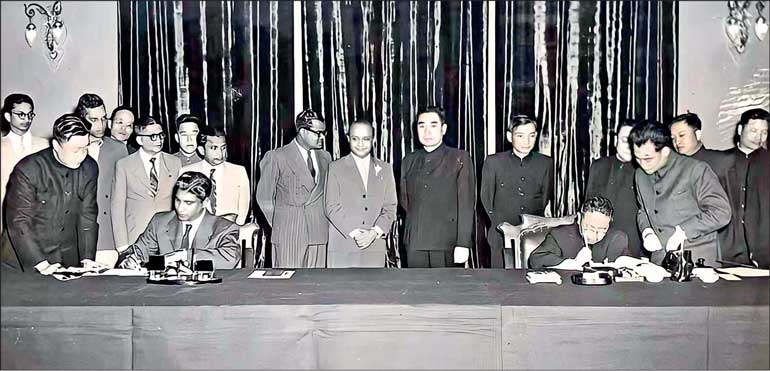Wednesday Feb 18, 2026
Wednesday Feb 18, 2026
Saturday, 8 January 2022 00:05 - - {{hitsCtrl.values.hits}}

 The year 1952 – when the historic agreement between China and Sri Lanka (then Ceylon) was signed, was called the China-Ceylon Rice Rubber Pact.
The year 1952 – when the historic agreement between China and Sri Lanka (then Ceylon) was signed, was called the China-Ceylon Rice Rubber Pact.
To quote the late Dr. J.B. Kehelgama when he addressed an august assembly in 2002 on the 50th anniversary of the agreement he said, “This agreement was the most useful one signed thus far with Sri Lanka and the most durable and successful in the world.” R.G. Senanayake, the then Minister of Trade and Commerce played a key role in negotiating this agreement, and saw it to fruition.
The necessity for this agreement
At a time when Ceylon was economically challenged in the early 1950s from an economic crisis due to a lack of foreign exchange, shortage of rice and reduced exports of commodities coupled with political upheavals, a far thinking Minister of Trade and Commerce formulated
this plan.
Why was there a shortage of rice?
Sri Lanka was importing rice at the time from Burma, Thailand and Indo-China as she had to give her citizens two measures of rice per person, per week at a subsidised rate.
Shortage of foreign exchange
The Korean war had ended and the USA/world demand for rubber had decreased by 38%. Due to global crises demand for tea and other commodities like coconut oil also decreased. Our foreign exchange reserves were dwindling.
1952 therefore was a challenging time. There was political upheaval. The Father of the Nation D.S. Senanayake had passed. The young green horn Dudley Senanayake had to form a government. R.G. Senanayake, a cabinet Minister of Trade, had a dire need to import rice. There was a lack of funds.
China could not obtain its requirement of rubber due to prevailing restrictions.
Thus, the agreement was formulated and signed renewable every five years with conditions for balance of payments to be met in forex. We exported rubber to China and China gave us rice in return.
Similarly, today, the country faces a forex shortage due to the global pandemic. It is time that we take a closer look at the pending Free Trade Agreement and execute it as it has been long overdue.
Globally, a majority of nations conduct trade under FTAs (Free Trade Agreements) with the WTO (World Trade Organization) overseeing trading activities.
Strengthening diplomatic ties
In 1957, the friendship with China was further strengthened with Sri Lanka opening its first mission in Beijing China. Wilmot Perera was the first Sri Lankan Ambassador to China.
In February this year, Sri Lanka and China celebrate 65 years of diplomatic ties, which further embodies our friendship.
We herald the visit of China’s Foreign Minister to Sri Lanka this week. The extension of the hand of friendship has been constant.
During the first few months of the pandemic, China donated approximately 2.7 million vaccines to Sri Lanka. A gift we will always acknowledge with thanks. We have imposing monuments in the city of Colombo which are outright gifts by the Republic of China.
The BMICH – gifted in 1976, the largest conference hall in Southeast Asia, hosting the Non-Aligned conference in 1976 with over 86 countries participating – putting us on the global stage.
The Nelum Pokuna, a theatre – which can house 1,269 persons in the audience and state-of-the-art facilities. The Nelum Kuluna – a lookalike of the Oriental Tower in Shanghai – housing offices/Sri Lankan IT sector, restaurants and leisure areas. This is a landmark feature in Colombo’s skyline today.
Like China, Sri Lanka also boasts of an ancient civilisation of over 2,500 years (China’s history dating back to 5,000 years). Evidence of this was when excavation was carried out in archaeological sites and Chinese coins and other artifacts were found, further evidence of trade in those early days between the two countries.
The time is ripe for the signing of the Free Trade Agreement between our two countries and the launch early this year of the Financial Centre in the Port City of Colombo.
(The writer is the Consul General of Sri Lanka in Shanghai.)